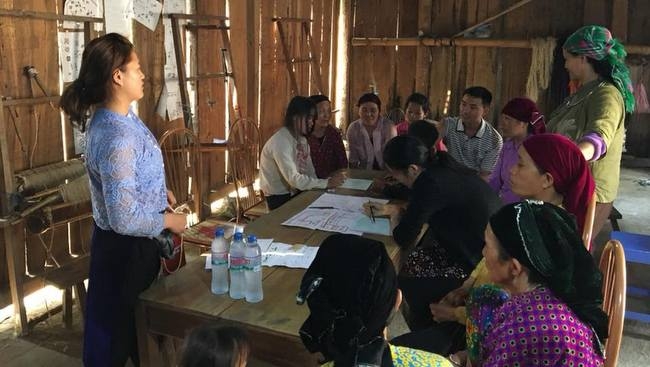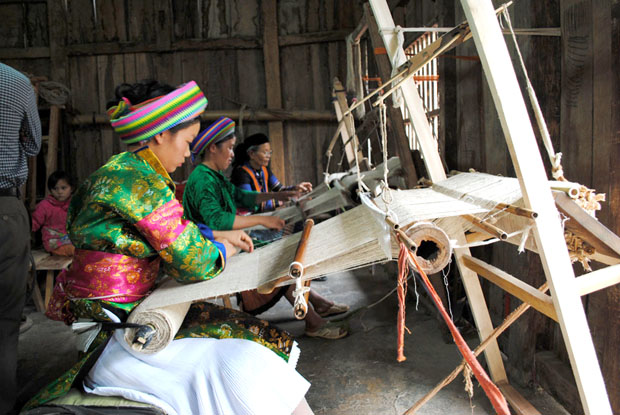



Members of Lung Tam linen weaving cooperative join the design for their
workspace. (Photo: fanpage 'Action for Lung Tam')
The project, entitled‘Action for Lung Tam’, aims to build a proper facility for the Lung Tam linen weaving cooperative, contributing to empowering women and providing sustainable development for the traditional craft village. The project has been implemented since May 2016 by seven young Vietnamese people, including Nguyen Huyen Chau as the coordinator, and four foreigners including architects Alexander Eriksson Furunes from Norway and Sudarshan Khadka from the Philippines, social enterprise consultant Rémi Gontier from France and independent filmmaker Eric Roache from the US.
Lung Tam linen weaving cooperative of the Mong ethnic minority people was formed over 16 years ago. Their products are not only popular throughout the country but are also exported to international markets. The cooperative’s founder Vang Thi Mai has made great efforts to develop the project, gaining impressive achievements. Traditionally, Mong women were not allowed to go to work; therefore, Mai and the other members tried for many years to persuade the locals to change their mindset. As a result, the number of the cooperative’s members is now 130 and the cooperative has improved the lives of the Mong women.
The young volunteers were impressed by Vang Thi Mai and her colleagues who have greatly contributed to the cooperative’s development. Huyen Chau shared: "The project’s formation did not originate completely from pity. We really respect the efforts of the local people in Lung Tam and treasure the values that they have preserved and promoted”.
Talking about the‘Action for Lung Tam’, she said that attending IATSS Forum’s programme on sustainable community development in Japan in 2016, the lessons shared by Kobe city and Mie province helped her to realise that a community would develop sustainably if the locals could directly benefit from the fruits of their labour, as well as being entitled to self-determination and joint responsibility to maintain their property and material facilities.
Three important architects in the team have lots of experience in designing community projects. Alexander Eriksson Furunes from Norway has joined the building of several works under the method of ‘co-creation’ with local communities in India, the UK and China. His companion Sudarshan Khadka stood side by side with him in the successful construction of the project ‘Studying Centre’ for Tacloban city in the Philippines, which was struck by the super typhoon Haiyan in 2013. Vietnamese architect Nguyen Cong Hiep is one of the key members of the project. He was the founder of the Community Architect – Arts Library’ in Hanoi (also called Co-AA Library Hanoi), as well as working with Huyen Chau to implement several community projects such as building schools for children in 2013.
In particular, during the process of implementing the project, the team has encouraged local people to join most activities, aiming to take advantage of their experience. They have come to Lung Tam many times and worked with the linen weaving cooperative’s members on different issues for the project. The local people were eager to measure the actual area of their workspace as well as design as architects. Through this method, the volunteers can study the locals’ habits of living and production as well as their demands. In contrast, participating in the project, the locals are able to learn more about the facility. Grasping the way to build the facility, the cooperative members would be more active in using or repairing it afterward.

At the Lung Tam linen weaving cooperative
(Photo: baohagiang.vn)
After working here, the volunteers realised that they were inspired by the local people who were always willing to learn and cooperate. Whenever visiting the village and listening to stories about the locals’ lives, the volunteer team’s members developed a stronger attachment to the land.